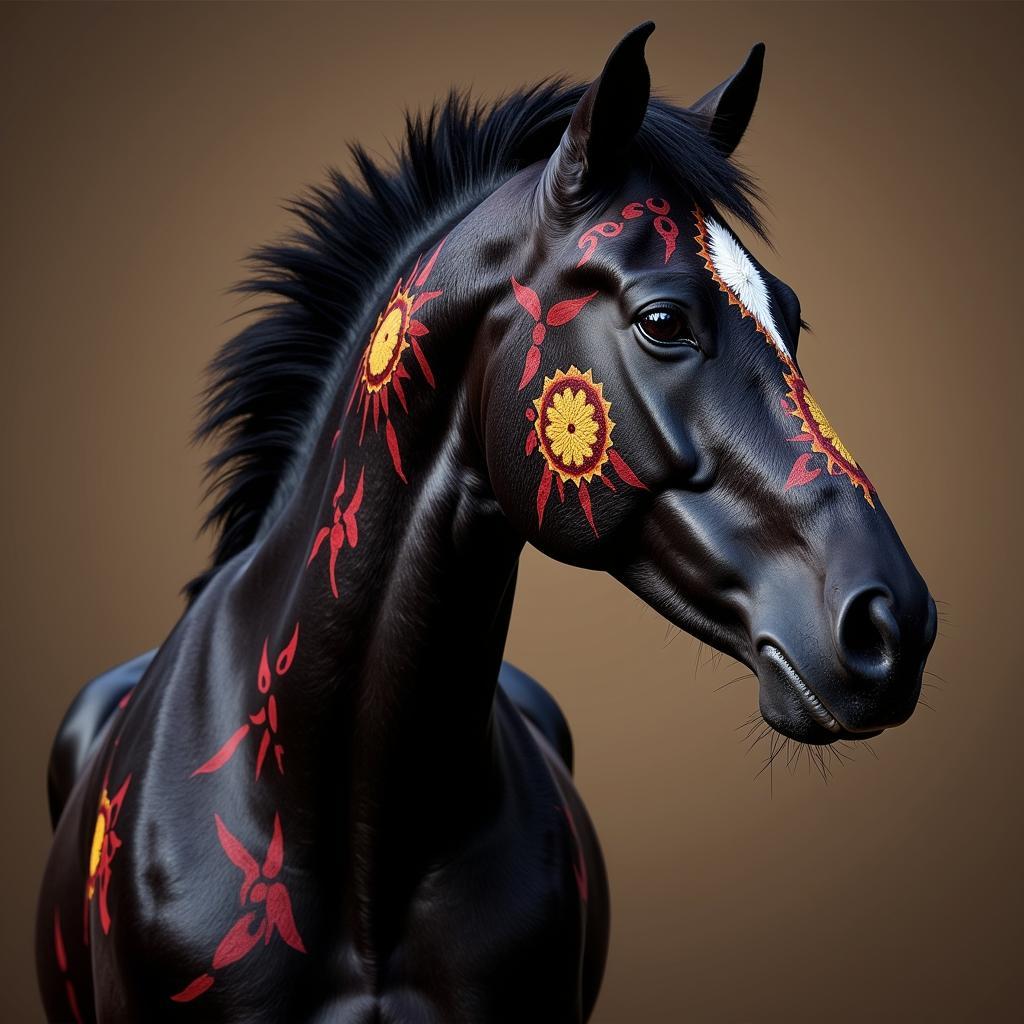Black Painted Horses evoke a sense of power, mystery, and artistry. Whether you’re fascinated by the traditional practice of war paint on horses or the modern interpretations in art and model horses, the image of a black horse adorned with vibrant colors is captivating. This article delves into the world of black painted horses, exploring their history, significance, and the various forms they take. We’ll examine everything from ancient traditions to contemporary artistic expressions.
The practice of painting horses, especially black ones, dates back centuries. Different cultures have used paint for various reasons, from camouflage in warfare to ceremonial adornment. Today, painted horses continue to inspire artists, model horse collectors, and horse enthusiasts alike. We’ll examine this rich history and explore the different meanings and interpretations associated with black painted horses.
The History of Painting Horses
The tradition of painting horses is deeply rooted in history, particularly within warrior cultures. Native American tribes, for example, often adorned their horses with war paint, believing it provided spiritual protection and enhanced their power in battle. These markings were not merely decorative; they held symbolic meaning and served as a form of communication. Similarly, other cultures around the world have employed horse painting for ceremonial purposes, using vibrant colors and intricate designs to express cultural identity and spiritual beliefs.
Beyond the battlefield and ceremonies, the image of the painted horse has also found its way into art and folklore. The black horse, often symbolizing mystery and power, provides a striking canvas for artistic expression. From cave paintings depicting prehistoric horses to contemporary sculptures and paintings, the black painted horse continues to captivate our imaginations.
 Native American War Horse with Traditional Paint
Native American War Horse with Traditional Paint
Black Painted Horses in Modern Times
Today, the tradition of painting horses lives on in various forms. Model horse collectors often customize their figurines, transforming ordinary black horses into unique works of art. These “Breyer Arabian Horse” creations can range from realistic depictions of historical war horses to fantastical creatures inspired by mythology and folklore. You can find similar artistic representations in the world of “folk art horse” where carvers and painters create stylized horse figures. These pieces often reflect cultural traditions and personal artistic visions, demonstrating the enduring appeal of the painted horse.
Are There Concerns with Painting Real Horses?
While the artistic representation of painted horses is celebrated, the practice of painting real horses raises important ethical considerations. Some paints can be harmful to a horse’s skin and coat, potentially causing irritation or allergic reactions. It’s crucial to prioritize the horse’s well-being and avoid any practices that could compromise its health. If you are considering painting a real horse, always consult with a veterinarian to ensure the safety of the products and methods used. There are safe, non-toxic paints available specifically designed for horses, particularly for events like parades or shows. Perhaps, instead of painting a horse for Halloween, consider a “Halloween costume for horse and rider” that is comfortable and safe.
The Symbolism of the Black Painted Horse
The black painted horse carries a rich symbolism. The black coat itself often represents power, mystery, and the unknown. When adorned with paint, the horse takes on additional layers of meaning. The colors and patterns can symbolize anything from spiritual protection and tribal affiliation to personal expression and artistic vision. In some cultures, a “Trail of Painted Ponies Medicine Horse” represents healing and spiritual guidance. These layers of meaning add to the mystique and allure of the black painted horse.
Conclusion
From ancient warrior traditions to modern artistic interpretations, the black painted horse continues to fascinate and inspire. Whether admiring a meticulously painted model horse or contemplating the symbolic meaning behind a painted war horse, the image evokes a sense of power, mystery, and artistry. By understanding the history and significance of painted horses, we can appreciate the enduring appeal of this captivating subject.
FAQ
-
What is the historical significance of painting horses?
Painting horses has a long history, primarily associated with warrior cultures and ceremonial practices. -
What are the modern interpretations of black painted horses?
Today, black painted horses are often seen in model horse collecting, art, and cultural celebrations. -
Are there ethical concerns with painting real horses?
Yes, using potentially harmful paints on real horses raises ethical concerns. Always prioritize the horse’s well-being. -
What does the black painted horse symbolize?
The black painted horse can symbolize power, mystery, spiritual protection, and artistic expression. -
Where can I find examples of black painted horses in art?
You can find examples in museums, galleries, and online platforms showcasing equine art. -
What kind of paint is safe for horses?
Only use non-toxic paints specifically designed for horses. Consult a veterinarian for guidance. -
Are there alternatives to painting a horse?
Yes, consider costumes or other decorative accessories that don’t involve applying paint directly to the horse.
Situations and Questions
You might wonder what type of paint is suitable for a “zebra carousel horse.” While decorative carousel horses can be painted with various paints, real zebras should never be painted. Their unique coat patterns are essential for their natural behaviors and social interactions.
Further Exploration
Explore our website for related articles, such as “Breyer Arabian Horse” and “Folk Art Horse”.
Contact Us
For any inquiries or assistance, please contact us at Phone: 0772127271, Email: [email protected] or visit our address: QGM2+WX2, Vị Trung, Vị Thuỷ, Hậu Giang, Việt Nam. Our customer service team is available 24/7.